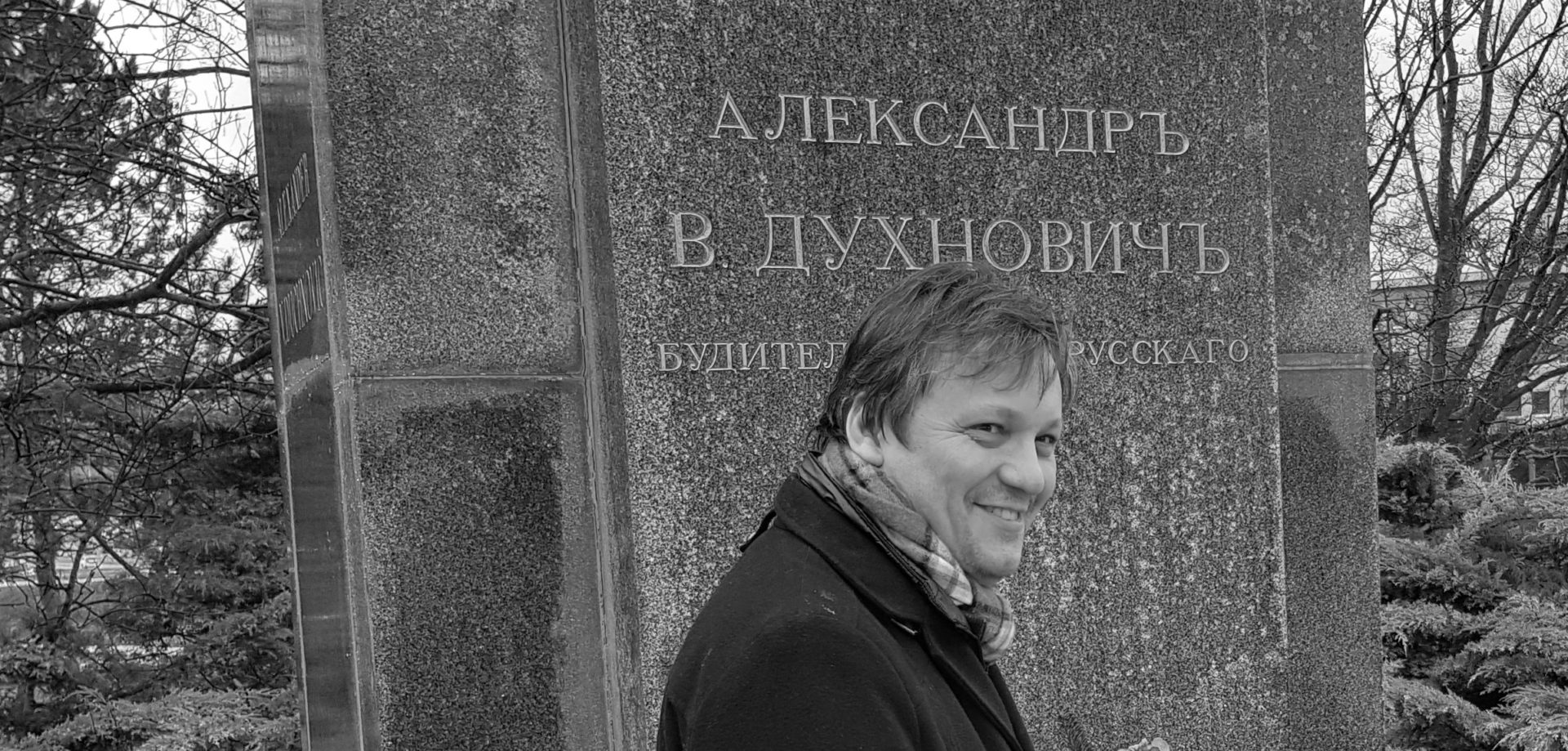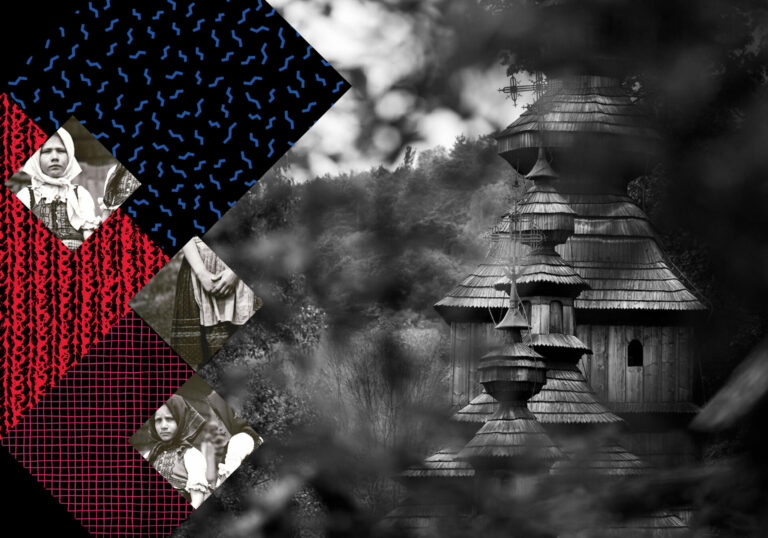Bogdan Gambal (1965-2020). Rusyn intellectual, visionary and politician.
Bogdan Gambal was a man of great depth. He had a great sensitivity, empathy, and intuition. He was unreservedly in love with Lemkovyna, and its language, history, and tradition, and he devoted all his talents, energy, and heart to it. He was also a connoisseur and an expert in culture and art, in general.
He was a committed proponent of strong cooperation between Rusyns of all countries. The Rusyns of Slovakia bestowed the Order of Adolf Dobrianski on him in February this year. Also, he served as an honorary member of the Association of Aleksander Duchnovyč in Prešov, and was the long-time chairman of the Ruska Bursa and lem.fm editor-in-chief. He died late in the evening on July 2, 2020, after a short, severe, and rare neurological disease, the etiology of which was not fully diagnosed. Fighting the disease for over three months under the extraordinary circumstances of the pandemic did not bring a satisfactory result, despite involving family, relatives, and friends. The miracle that everyone was waiting for with all their might did not come, as the doctors refused to give any hope.
First Lemko youth
Bogdan Gambal was born on February 26, 1965 in the west of Poland, in the town of Polkowice, near Lubin. His parents came from the villages of Odyrne and Czarna in Lemkovyna. Although he grew up in exile and finished school there, he was always attracted to the mountains. In 1985, he graduated from the Technical Motor School in Legnica, and then arrived to Kraków to study technical education at the Pedagogical University. He lived in the students’ dormitory on the campus, and immediately became involved in meetings at the Greek Catholic parish and the USKT [Ukraińskie Towarzystwo Społeczno-Kulturalne / Ukrainian Social and Cultural Society] house at ul. Dietla 19. In this environment, his dominant Lemko character was clearly shaped, and Bogdan began to be called “Молодый” [“Young”] (because a young Lemko came in to the environment). As his peers recall him, he spoke beautifully in Lemko and he knew how to build community social life, including organizing trips to Lemkovyna. After a year, he had quit his studies at the Pedagogical University and began studying ethnography at Jagiellonian University. In addition to him, there were two other Lemkos in his year, and starting in 1987, they began going to research camps. In the same year, he became involved in two Lemko projects (a verbal and musical performance about displacement; the Polish-Lemko dictionary financed by the Scientific Research Committee). Both projects were led by Professor Olena Duć-Fajfer, who especially at that time cooperated very closely and ideologically influenced Bogdan. So, in 1988, together with a group of students, and Bogdan Gambal himself, they took part in the organizational committee and meeting in Bielanka, preparing the 6th Lemko Vatra in Bortne. Already then, there were strong attempts by USKT activists to take over the Vatra. But this meeting had allowed the Vatra to remain in the hands of the Lemkos for a few more years. Events related to the next Vatras and surely the takeover of this event by the Ukrainians of Lemko origin, left a strong impact on Bogdan Gambal’s views and activities, strongly influencing his actions and politics of later periods. His first publication, in the form of two poems, appeared in 1988 Голос Ватры [Voice of the Vatra]. He also took part in the founding meeting of the Стоваришыня Лемків [Lemko Association]. In 1991, he began PhD studies in ethnography at Jagiellonian University. Under the supervision of Professor Anna Zambrzycka, he worked on the theme of holidays and celebrations in Lemkovyna, but he did not complete these studies (the reason is not clear, whether it was the advisor’s death in 1993 or the necessity to start a paid job). In the next years, he searched for various documents, demonstrating interest, among others, in the Jaworzno case.
Ruska Bursa
One of the most engaging matters for him was the matter of the Ruska Bursa. He repeatedly met with a Bursa alumnus, Petro Fecica from Kraków. He received a lot of valuable pieces of information from him, found the pre-war statute and reminiscences of the last head of the Bursa, Roman Maksymowycz. In June 1991, he organized a meeting at which the “Ruska Bursa” Association in Gorlice was founded again. He was the originator of the idea of reactivating the Association with the original pre-war statute. From 1993-1995, 2001-2015, and 2019-2020, he chaired the Association. Together with Professor Duć-Fajfer, he coordinated the process of recovering the building and the land plot of the former Ruska Bursa. During numerous meetings with the civil authorities, he received support and power of attorney from other Lemko organizations, as well as from distinguished activists, such as Jarosław Trochanowski and Paweł Stefanowski. The entire Ruska Bursa recovery process lasted nearly 19 years, engaging professional lawyers and central level officials. The signing of the notarial deed of ownership of Ruska Bursa by Bogdan Gambal as the then chairman of the Association took place on September 9, 2009 in Gorlice.
At the same time, from the beginning of the current century, he coordinated all the Association’s activities, and especially the general refurbishment of the building, heavily neglected for years. Together with Irena Kwoka, a Ruska Bursa activist, they went through a difficult formal path related to projects, permits, and finally finances. From the beginning of the grant system, he edited numerous applications for grants aimed at developing and protecting Lemko culture and identity. The Ruska Bursa is, among other things, a library, cultural center, publisher, and much more.
lem.fm radio
In 2010, he came up with the idea to create the first Lemko Internet radio, which we know today as lem.fm, opening up a new chapter and quality for Lemko journalism and journalism. Since 2011, a group has formed that produces, records, protects, and creates Lemko content daily. The Internet portal, music publishing house, and many other single actions also developed intensively on the radio. He was the editor-in-chief of the radio from 2011-2012, and again from 2015 until his death.
Editor and journalist
In parallel with organizational activities, Bogdan Gambal was involved in journalistic activities. From the establishment of the academic journal Річник Руской Вурсы [Ruska Bursa Annual], he regularly wrote scholarly texts and edited the chapter called” Documents.” He also published in Бесідa [Besida], and then in the biweeklies НН ІнфоРусин [NN InfoRusyn] and Голосі Русина [Holosi Rusyna]. On lem.fm radio, he hosted avant-garde programs, including Гравце, Тыжден дозаду [Last Week], Раз Два Три [One Two Three], Пропаґанда [Propaganda], and conducted numerous conversations, interviews, and reports. He also hosted the daily live program, Фрыштик [Breakfast].
Lemko Institute
Among many strategic and visionary ideas, Bogdan Gambal’s idée fixe was to create a professional Lemko Cultural Institution. After establishing a subcommittee at the Joint Commission of the Office and National and Ethnic Minorities, he was delegated there by the then-representative of the Lemko community, Professor Olena Duć-Fajfer, and he became very involved in its activities. Among other things, he presented a prepared, well thought-out project of an institute with dominant research, publishing, promoting, educating, etc. aspects. He invited all Lemko and church organizations to a broad consultation on this matter, and was inspired only by the prospect of the nation-wide benefit. In 2010, he applied to the relevant ministry to establish such a body. Unfortunately, the application has not been considered yet. The competition between Lemko and Ukrainian activists, lack of unification in the community, and the hostile political atmosphere have strongly contributed to this fact.
Paulo Maleckij
Translation: Helena Stefanowska
Proofreading: Maria Silvestri
Publikacja wyraża jedynie poglądy autora/ów i nie może być utożsamiana z oficjalnym stanowiskiem Ministra Spraw Wewnętrznych i Administracji.
Публикация выражат лем погляды автора/авторів і не може быти принимана як офіцияльне становиско Міністра Внутрішніх Справ і Адміністрациі.
Zrealizowano dzięki dotacji Ministra Spraw Wewnętrznych i Administracji.
© Copyright lem.fm, 2025. Вшыткы права застережены.







